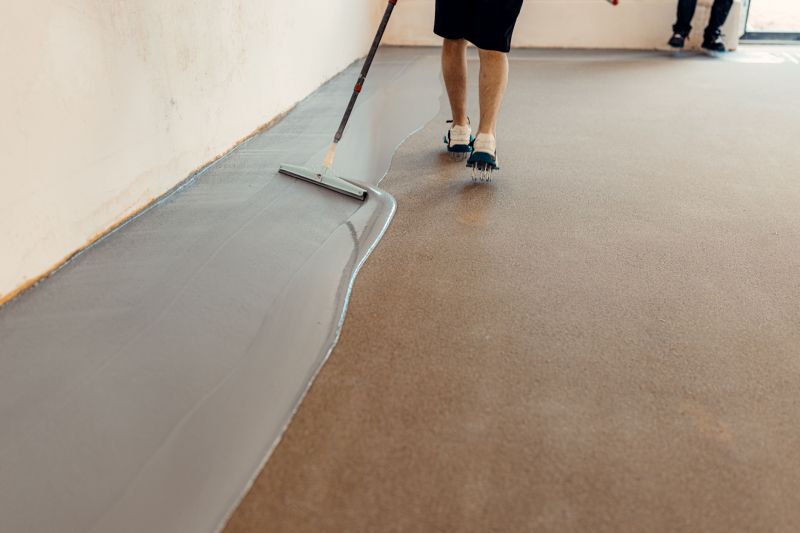Expert Picks for Garage Coating Applications That Transform Your Space
Find the most effective coatings for achieving a smooth, durable, and attractive garage floor surface.
 Garage coating products serve as a protective layer that enhances the durability and appearance of garage floors. These coatings help guard against stains, chemical spills, abrasions, and moisture infiltration, contributing to a cleaner and more maintained space. When choosing a coating, it is important to consider factors such as surface compatibility, ease of application, drying time, and the level of slip resistance provided. Different formulations are available to suit various needs, from basic protective layers to more specialized options that address specific concerns like chemical resistance or decorative finishes.
Garage coating products serve as a protective layer that enhances the durability and appearance of garage floors. These coatings help guard against stains, chemical spills, abrasions, and moisture infiltration, contributing to a cleaner and more maintained space. When choosing a coating, it is important to consider factors such as surface compatibility, ease of application, drying time, and the level of slip resistance provided. Different formulations are available to suit various needs, from basic protective layers to more specialized options that address specific concerns like chemical resistance or decorative finishes.
Top Overall Option
Polyurethane Garage Floor Coating
Polyurethane coatings are known for their strong adhesion, chemical resistance, and durability. They can provide a hard, protective surface that withstands heavy use and spills, making them a popular choice for garage applications. These coatings often feature a high-gloss finish that can enhance the overall look of the space, while also offering excellent resistance to abrasions and stains. Proper surface preparation and application are essential to achieve optimal results, but when applied correctly, polyurethane coatings can offer long-lasting protection for garage floors.
Types of Products For Garage Coating Applications
Epoxy Coatings
Epoxy coatings create a hard, durable surface ideal for high-traffic garage floors, offering resistance to stains and chemicals.
Polyurethane Coatings
Polyurethane provides a flexible, chemical-resistant, and glossy finish suitable for garages exposed to heavy use.
Acrylic Sealers
Acrylic sealers are easy to apply and dry quickly, offering basic protection and a clean appearance.
Polyaspartic Coatings
Polyaspartic coatings cure rapidly and provide UV stability, making them suitable for quick turnaround projects.
Concrete Stains
Concrete stains add color and aesthetic appeal, often used as decorative overlays or accents.
Garage Floor Paints
Specialized garage paints offer a simple, cost-effective coating option with decent durability.
Quartz Aggregate Coatings
Quartz coatings incorporate aggregate for slip resistance and a textured finish.
Rubberized Coatings
Rubberized coatings provide a flexible, impact-resistant surface that can absorb shocks.
Polymer Resins
Polymer resins are used for custom coatings, offering tailored properties for specific needs.
Vapor Barriers
Vapor barriers prevent moisture transmission, protecting the coating and underlying concrete.
Self-Leveling Coatings
Self-leveling coatings create smooth, even surfaces ideal for uneven concrete floors.
Anti-Slip Additives
Additives enhance traction, reducing slip hazards on coated surfaces.
Garage Floor Decoratives
Decorative coatings include patterns, textures, and color blends for aesthetic customization.
Chemical-Resistant Coatings
Designed to withstand spills of oils, acids, and other chemicals common in garages.
High-Temperature Coatings
Suitable for areas exposed to heat, such as near engines or heating units.
Popular Choices
Epoxy coatings are frequently selected for their strength and chemical resistance, suitable for various garage environments.
Polyurethane options are popular for their glossy finish and resistance to wear.
Acrylic sealers are favored for quick application and affordability.
Polyaspartic coatings are trending for their fast curing times and UV stability.
Garage paints are common for budget-friendly, straightforward coating projects.
Quartz finishes are chosen for slip resistance and textured look.
Rubberized coatings are popular for impact absorption and flexibility.
Self-leveling options are sought after for creating smooth, even surfaces.
Chemical-resistant options are in demand for garages handling various spills.
Decorative finishes are trending for aesthetic customization and personalization.
Anti-slip features are increasingly incorporated for safety.
Vapor barriers are widely used to prevent moisture issues beneath coatings.
Applying the right garage coating can also improve safety by reducing slips and falls, especially in environments prone to spills or moisture. The surface preparation process is crucial for optimal adhesion; cleaning, etching, or priming may be necessary depending on the product. Many coatings are designed for DIY application, featuring user-friendly instructions and tools, while others may require professional installation for best results. Durability and longevity are key considerations, with some products offering multi-year protection, while others are suitable for short-term or seasonal use.
Choosing the appropriate coating involves understanding the specific demands of your garage environment, including foot traffic, vehicle weight, and exposure to chemicals or moisture. It is recommended to evaluate product specifications, drying times, and maintenance requirements before making a selection. Proper application and regular upkeep can extend the life of the coating, maintaining the garage’s appearance and functionality over time. Whether you seek a simple protective layer or a decorative finish, there are numerous options available to meet diverse preferences and needs.
Key Buying Considerations
- Surface compatibility and adhesion properties of the coating.
- Intended use and traffic level of the garage floor.
- Chemical resistance, especially if spills are common.
- Drying and curing times to fit your schedule.
- Ease of application for DIY projects or professional installation.
- Finish appearance, including gloss level and color options.
- Slip resistance features or additives for safety.
- Durability and longevity of the coating under heavy use.
- Moisture and vapor barrier requirements to prevent damage.
- Environmental conditions such as UV exposure or temperature fluctuations.
- Maintenance and cleaning needs of the coated surface.
- Cost considerations and value for the investment.
- Compatibility with existing flooring or overlays.
- Availability of necessary tools and accessories for application.
- Warranty or manufacturer support for the product.
